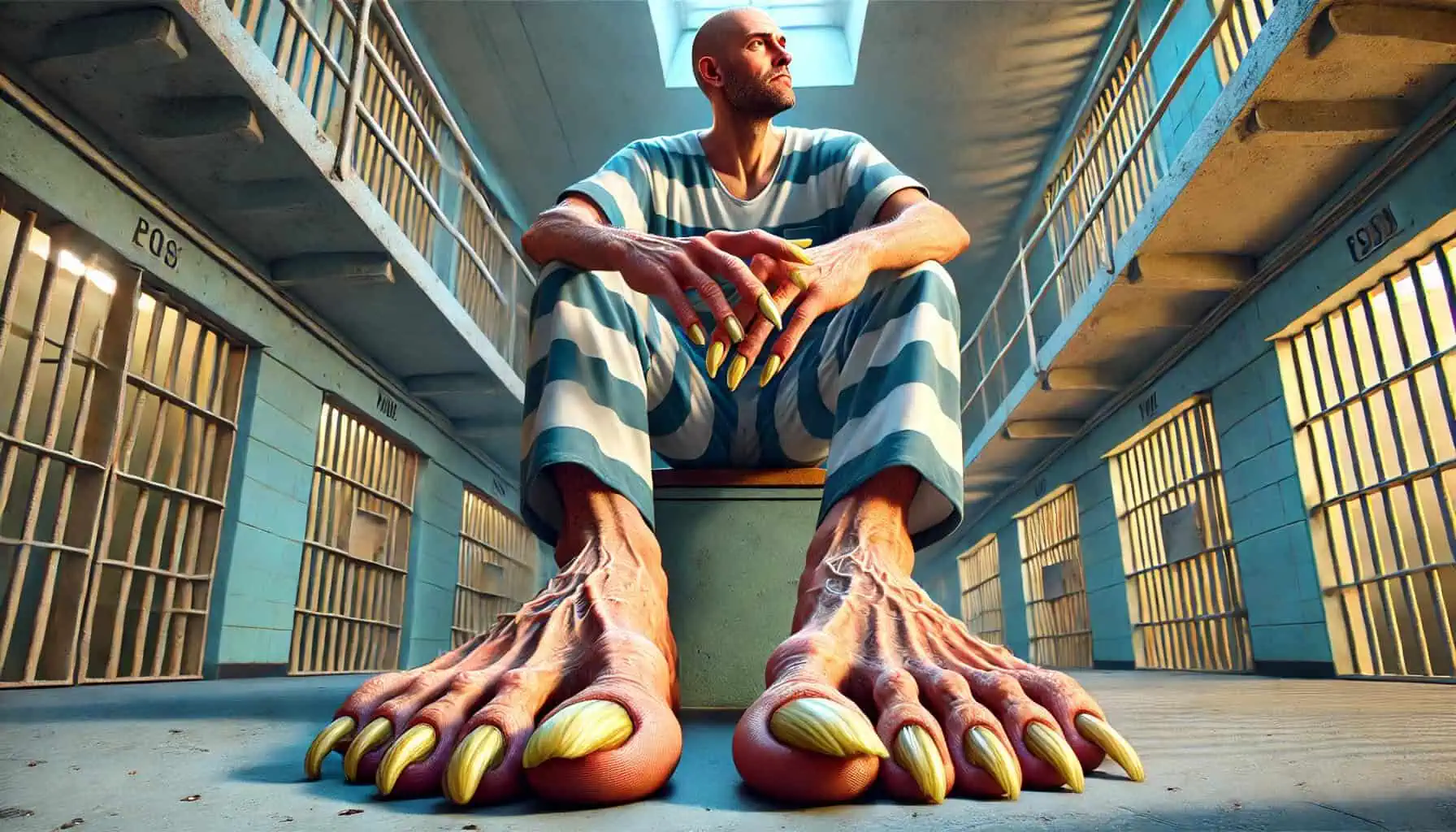In the free world, they’re harmless, ordinary, and essential: nail clippers, salt packets, a bottle of Claritin, a pen. But in Georgia’s prison system, these items can get you a disciplinary report—or worse.
Georgia’s Department of Corrections (GDC) has one of the broadest definitions of contraband in the nation. Anything not specifically issued by the facility or purchased through commissary is banned. That includes a long list of non-dangerous everyday items, which in turn creates a system where basic hygiene, health, and comfort are nearly impossible without outside support or black-market workarounds.
It’s not just dehumanizing. In some cases, it’s dangerous.
Banned for “Security,” Denied for Survival
Nail clippers are classified as contraband unless explicitly issued under supervision. Many prisons don’t offer them at all. Instead, prisoners are forced to peel their nails, grind them down on concrete, or simply let them grow painfully long. In one case, a woman at a Georgia prison reportedly used borrowed nail clippers and a mirror to remove her own stitches after childbirth when she was denied medical care 1.
I paid $50 for a pair of nail clippers, I kept them for two years before they were confiscated, but being able to have clean cut nails was worth every penny. I’m trying to find another pair now.
Dental floss is banned for its supposed “security risk.” But the alternative—nothing—leads to gum disease, tooth loss, and chronic infection. Some prisons offer floss picks, but many provide nothing at all 2.
Mirrors are forbidden. They sell a cheap plastic mirror that is smaller than a paperback book and only shows a as warped image of part of your face. Shaving, grooming, or examining a wound becomes a challenge when you can’t see your own face.
Hygiene, Health, and Contraband
Emory boards—used to file nails—are only sold at a handful of Georgia prisons. In most, they’re unavailable. Disposable razors are banned in dorms, even though inmates are expected to remain clean-shaven.
In the prison where I’m at, you can’t have Emory boards. To cut your nails you can go to the barbershop and use a pair that everyone else has used countless times without cleaning. Or you can pay $5.00 for a medical request and get called out to use their “cleaner” nail clippers.
We are forced to buy electric razors, which are very overpriced, because they no longer want to provide or sell the cheap disposable razors. Now most prisoners are forced to grow beards—which can get you in trouble as well.
Mouthwash, Claritin, antacids, antibiotic cream, and Band-Aids are all considered contraband unless prescribed. But getting a prescription costs money: $5 for a visit, $5 more for the medication, and that’s only if the medical department agrees you need it.
First aid supplies, from antiseptic wipes to gauze, are unavailable without a trip to medical—which many can’t afford or are denied. It’s not uncommon to see inmates using tissue or torn fabric as makeshift bandages, or suffering through untreated infections.
Toilet tissue is not contraband, but you are restricted to one roll a week and there is no way of getting an extra roll unless another prisoner is willing to sell their roll to you. The going rate is either one or two soups depending on how many “junkies” are in your dorm willing to forego their weekly allowance for a high.
We won’t contemplate what those who sell their allowance do without toilet paper.
Sometimes the prison gets half rolls of toilet paper. But they don’t give you two rolls to make up for the missing quantity, you’re expected to make do. The last time this happened for 4 weeks in a row. I was forced to use my facecloth and wash it afterwards. This was totally disgusting and humiliating. I will never forgive the Georgia prison system for how they made me live.
Eating utensils? Only the plastic spork issued in the cafeteria is allowed—and you’d better not take it back to the dorm. Having it in your property is considered contraband.
Tupperware bowls? Banned. Napkins? Not provided. You eat with what you’re given, when you’re given it—and you hope it doesn’t make you sick. You wipe your mouth on your hands, then on your pants.
While discussing hygiene, we should also talk about the dish washers in the GDC. Almost all of them are broken. Some work partially, but very few are fully functional. They either don’t have the steam to disinfect the trays, the soap dispensers don’t work, or often the machines don’t operate at all. Most are 30 years old and have never been maintained or replaced. So what do these kitchens do to clean the trays and sporks? They have inmates dunk the tray in a barrel of water and chemicals, rice the tray and stack them. When the trays are used again they are usually wet and have food or food stains on them from their last use.
Entertainment and Communication
Forget personal TVs. Georgia inmates are allowed only cheap radios, which break easily and barely receive signal. Commissaries sell earbuds and headphones, but they’re flimsy and expensive. There’s no repair or replacement unless you pay again.
Tools of any kind are banned. Need to tighten the screw on your glasses, forget it. Even fixing a broken radio or tightening a loose screw can be seen as possessing contraband. You’re expected to survive in a system where nothing works—and nothing gets fixed. Glue, good luck, it’s contraband as well. Prisoners make homemade glue from coffee creamer or toothpaste.
Writing materials, including pens, pencils, paper, and stamps are also restricted. Indigent inmates can be charged for these items as debt. If you’re poor, even writing a letter home or to a lawyer becomes a financial burden 2.
Common items that can help you organize your legal papers like paperclips and rubber bands are contraband.
The Real Cost of Banning the Basics
These policies don’t make prisons safer. They make survival harder. They breed desperation, spread disease, and punish poverty. When prisoners can’t take care of their basic hygiene, it affects their mental health, dignity, and sense of self-worth.
They also isolate people further from their loved ones. No pens, no stamps, no phone access—and yet GDC bans the cell phones prisoners use to stay in touch and expose abuse.
These aren’t “luxuries.” These are basics—things every human being needs. Denying them doesn’t serve justice. It only reinforces control, neglect, and dehumanization.
The Big Picture
As we’ve reported in other GPS investigations:
• Nutrition Neglect shows how poor food and commissary restrictions lead to starvation and violence https://gps.press/nutrition-neglect-how-georgias-prison-food-is-fueling-violence/.
• Invisible Scars explores the trauma of life in Georgia’s prisons, where things like razors or toothpaste become privileges instead of necessities https://gps.press/invisible-scars-how-georgias-prisons-perpetuate-trauma-and-abuse/.
• Guilty Until Proven Innocent highlights how a lack of resources and oversight compounds suffering for the wrongly convicted https://gps.press/guilty-until-proven-innocent-you-will-be-found-guilty/.
Final Word
You wouldn’t survive a week in a Georgia prison without basic items like floss, nail clippers, salt, or a Band-Aid. But thousands of Georgians live that reality every day—punished not only by the system, but by its cruel indifference to their most basic human needs.
These aren’t security risks. They’re life risks. And banning them doesn’t make Georgia safer. It only reveals how broken the system truly is.
Use Your Voice: Demand Dignity
If this outrages you, don’t just scroll past—speak up. Use Impact Justice AI to generate a personalized email and send it to lawmakers, parole board members, and the media. It takes less than five minutes. Visit ImpactJustice.AI and choose a topic—or create your own.
Tell them the truth: Georgia prisoners deserve basic hygiene, proper nutrition, and a chance at rehabilitation. Demand better conditions. Demand that the parole board release those who’ve already done the work of changing their lives.
Because no one should be punished with moldy food, no floss, or a disciplinary report for having a plastic spoon.


